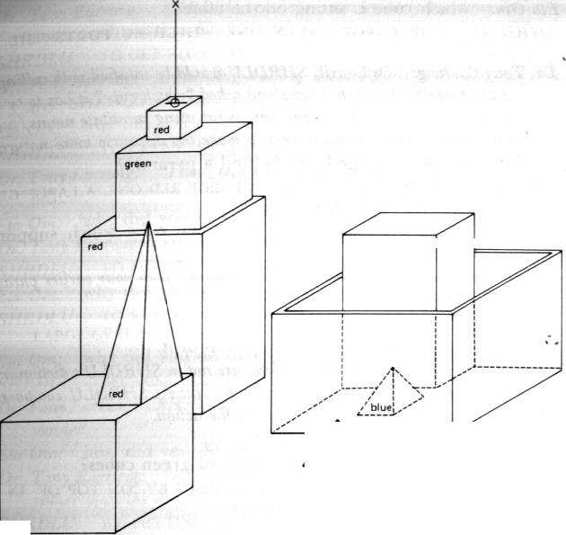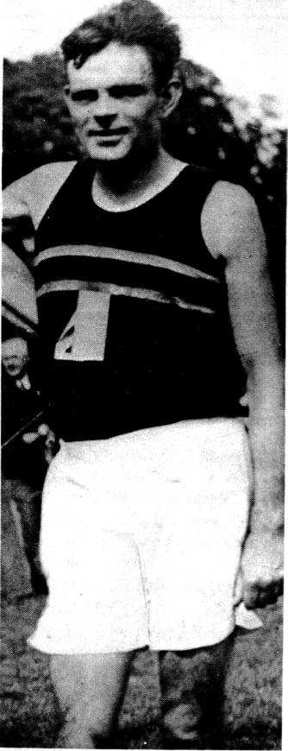Gödel, Escher, Bach: An Eternal Golden Braid (106 page)
Read Gödel, Escher, Bach: An Eternal Golden Braid Online
Authors: Douglas R. Hofstadter
Tags: #Computers, #Art, #Classical, #Symmetry, #Bach; Johann Sebastian, #Individual Artists, #Science, #Science & Technology, #Philosophy, #General, #Metamathematics, #Intelligence (AI) & Semantics, #G'odel; Kurt, #Music, #Logic, #Biography & Autobiography, #Mathematics, #Genres & Styles, #Artificial Intelligence, #Escher; M. C

SHRDLU: YES, THE RED CUBE.
8. Eta Oin: is it supported?
SHRDLU: YES, BY THE TABLE.
Dr. Tony Earrwig: SHRDLU has heuristics about what information is relevant to
a person who asks a question, even if the person does not request that information
specifically.
9. Eta Oin: can the table pick up blocks?
SHRDLU: NO,
Dr. Tony Earrwig: SHRDLU's semantic rules include the knowledge that "picking
up" must be done by an animate object, and that the table is not animate.
10. Eta Oin: can a pyramid be supported by a block?
SHRDLU: YES.
Dr. Tony Earrwig:• SHRDLU's deductive system finds an actual example, so it
knows this is possible
.
11. Eta Oin: can a pyramid support a pyramid?
SHRDLU: I DON'T KNOW.
Dr. Tony Earrwig: The question makes sense, but there is no example in the
scene. SHRDLU has no way of looking into the details of its programs, even
though these ultimately define its capabilities
.
12. Eta Oin: stack up two pyramids.
SHRDLU: I CANT.
Dr. Tony Earrwig: SHRDLU tries and fails.
13. Eta Oin: the blue pyramid is mine.
SHRDLU: I UNDERSTAND.
Dr. Tony Earrwig: All of the information about colors, shapes, sizes and locations
of the objects is known to SHRDLU initially. Possession is left as an unknown
property of objects about which it can be told. It stores this information in its data
base.
14. Eta Gin: i own all blocks which are not red, but i don't own anything which supports a pyramid.
SHRDLU: I UNDERSTAND.

FIGURE 112. "
Will you please stack up both of the red blocks and either a green cube or
a pyramid?" [Adapted from Terry Winograd, Understanding Natural Language, p. 12
.
Dr. Tony Earrwig: The result of understanding these sentences is the creation of
new procedures within SHRDLU for deducing whether you own something.
15. Eta Oin: do i own the box?
SHRDLU: NO.
Dr. Tony Earrwig: The box supports whatever it contains, including a pyramid.
16. Eta Oin: do i own anything in the box?
SHRDLU: YES, TWO THINGS: THE BLUE BLOCK AND PYRAMID.
17. Eta Oin: will you please stack up both of the red blocks and either a green cube or a pyramid? [Refer to Fig. 112.
SHRDLU: OK.
Dr. Tony Earrwig: Logical connectives, such as "and", "or", "either", etc. are
handled in both the grammar and semantics. A command is executed even if it
looks like a question. The. command is carried out by the following series of
steps: SHRDLU puts a green cube on the large red block (it chooses the green
cube with nothing on it), then removes the small pyramid from the little red
cube, so that it can use that cube to complete the stack as specified.
18. Eta Oin: which cube is sitting on the table?
SHRDLU: THE LARGE GREEN ONE WHICH SUPPORTS THE RED
PYRAMID.
Dr. Tony Earrwig: Ordinarily SHRDLU would be satisfied with calling this "A
BIG GREEN CUBE", but since you asked "which cube" it has to be more spec /lc
in naming it. It has procedures for using substitute nouns (such as "one") and
pronouns in answers to make the discourse more natural.
19. Eta Oin: is there a large block behind a pyramid?
SHRDLU: YES, THREE OF THEM: A LARGE RED ONE, A LARGE GREEN
CUBE AND THE BLUE ONE.
20. Eta Oin: put a small one onto the green cube which supports a pyramid.
Dr. Tony Earrwig: "A small one" must contrast with your earlier phrase "a large
block", so this means "a small block". SHRDLU: OK,
21. Eta Oin: put the littlest pyramid on top of it.
Dr. Tony Earrwig: Words like "littlest" are not in SHRDLU's dictionary but are
interpreted from the root farms like "little". SHRDLU compares the sizes of all
the pyramids to carry out the action.
SHRDLU• OK.
22. Eta Oin: how many things are on top of green cubes?
SHRDLU: I'M NOT SURE WHAT YOU MEAN BY "ON TOP OF" IN THE
PHRASE "ON TOP OF GREEN CUBES"
DO YOU MEAN
1-DIRECTLY ON THE SURFACE
2-ANYWHERE ON TOP OF IT?
Dr. Tony Earrwig: In the previous sentence, the phrase "on top of " was
interpreted without trouble because the context made it clear what was meant. In
this one, the heuristics for disambiguation do not come up with a clearcut
definition, so SHRDLU had to ask you for more information. The paraphrases
were included with the dictionary definitions of "on". A request like this can
also occur when the meaning of a pronoun such as "it" or "they" is unclear.
23. Eta Din: had you touched any pyramid before you put the green one on the little cube?
SHRDLU: YES, THE GREEN ONE.
Dr. Tony Earrwig: SHRDLU deduces from its memory what event is being
referred to, and can relate other events to it in time. The analysis includes
complex tenses of verb groups, and there are special facilities for keeping
track of the various forms of irregular verbs like "have
".
24. Eta Oin: when did you pick it up?
SHRDLU: WHILE I WAS STACKING UP THE RED CUBE, A LARGE RED
BLOCK AND A LARGE GREEN ONE.
Dr. Tony Earrwig: A time is described by naming the main goal which was being
worked on.
25. Eta Oin: why?
Dr. Tony Earrwig: SHRDLU remembers immediately previous sentences to
understand questions like this and the following ones.
SHRDLU: TO GET RID OF IT.
Dr. Tony Earrwig: By keeping track of selected parts of the original subgoal tree,
SHRDLU has some understanding of its own motives.
26. Eta Oin: why did you do that?
SHRDLU: TO CLEAN OFF THE RED CUBE.
Dr. Tony Earrwig: "That" refers to the action mentioned in SHRDLU's last
answer.
27. Eta Oin: why did you clear off that cube?
Dr. Tony Earrwig: Here, "that" means the one just referred to. SHRDLU: TO
PUT IT ON A LARGE GREEN CUBE.
28. Eta Oin: why did you do that?
SHRDLU: TO STACK UP THE RED CUBE, A LARGE RED BLOCK, AND A
LARGE GREEN CUBE.
29. Eta Oin: why did you do that?
SHRDLU.' BECAUSE YOU ASKED ME TO.
Dr. Tony Earrwig: SHRDLU remembers what it did, not how the request was
worded
.
30. Eta Oin: how did you do it?
Dr. Tony Earrwig: "It" refers to the action mentioned in the last question,
rather than the answer.
SHRDLU: BY PUTTING A LARGE RED BLOCK ON THE TABLE; THEN
LETTING GO OF IT; THEN PUTTING A LARGE GREEN CUBE ON IT; THEN LETTING GO OF THAT CUBE; THEN PUTTING THE RED CUBE
‘
ON THAT CUBE; THEN LETTING GO OF THAT CUBE.
Dr. Tony Earrwig: This is a description of the top-level subgoals used to
achieve the goal.
31. Eta Oin: how many objects did you touch while you were doing it?
Dr. Tony Earrwig: Time references can refer to a time span, using words like
"while".
SHRDLU: FOUR OF THEM.
32. Eta Oin: what did the red cube support before you started to clean it off?
SHRDLU: THE GREEN PYRAMID.
Dr. Tony Earrwig: By remembering what has been moved, it is possible to
deduce things about earlier states of the scene. You can use complex nestings
of clauses like "before you started to clean it off ".
33. Eta Oin: there were five blocks to the left of the box then.
Dr. Tony Earrwig: "Then" must refer to the time mentioned in the last sentence.
SHRDLU: NO, ONLY FOUR OF THEM: THE RED CUBE, TWO LARGE
GREEN CUBES, AND A LARGE RED BLOCK.
Dr. Tony Earrwig: Earlier in the dialogue, information about "owning" was
accepted at face value. But SHRDLU knows that it has complete infornia-tion about the basic properties of objects, including location. It checks any statements about these to see whether it agrees or disagrees.
34. Eta Oin: put the blue pyramid on the block in the box.
Dr. Tony Earrwig: This is syntactically ambiguous, but is understood without
ambiguity since the parsing corresponding to "put the blue pyramid which is
on the block into the box" does not make sense in the current scene, whereas
"put the blue pyramid onto the block which is in the box" does. SHRDLU: OK.
35. Eta Oin: is there anything which is bigger than every pyramid but is not as wide as the thing that supports it?
Dr. Tony Earrwig: SHRDLU understands quantifiers such as "every", "any",
"some", etc., and structures such as "bigger than", "as wide as", etc.. Here "it"
refers to a noun group within the same sentence but two levels up in the parsing
tree.
SHRDLU: YES, THE BLUE BLOCK.
36. Eta Oin: does a steeple
SHRDLU: SORRY, I DON'T KNOW THE WORD "STEEPLE".
Dr. Tony Earrwig: SHRDLU interrupts immediately when it sees a word it doesn't
know.
37. Eta Oin: a "steeple" is a stack which contains two green cubes and a pyramid.
Dr. Tony Earrwig: The quote marks indicate that you are defining a new word.
The definition is added to SHRDLU's dictionary in a form compatible with all the
words it already knows.
SHRDLU: I UNDERSTAND.
38. Eta Oin: are there any steeples now?
SHRDLU: NO.
Dr. Tony Earrwig: The new definition is used as a description to recognize
steeples.
39. Eta Oin: build one.
SHRDLU: OK.
Dr. Tony Earrwig: The description given in the definition is enough to deduce a
plan for building new objects as well as recognizing them. The word "one" means
"a steeple", and the plan is carried out. First, one of the large green cubes is
cleared off by removing the red cube and two pyramids. Then the two green cubes
and the tall red pyramid are stacked up to fit the description.
40. Eta Oin: call the biggest block "superblock".
SHRDLU: OK.
Dr. Tony Earrwig: You can also give objects names.
41. Eta Oin: have you picked up superblock since we began?
SHRDLU: YES.
42. Eta Oin: why did you drop it?
SHRDLU: BY "IT", I ASSUME YOU MEAN THE SUPERBLOCK. I CAN'T
EXPLAIN A NON-EXISTENT EVENT.
Dr. Tony Earrwig: There is no record in SHRDLU's memory of any block being
dropped. The answer routines have special checks for this type of "loaded
question" which presupposes things which aren't true.
43. Eta Oin: is there anything to the right of the red pyramid?
SHRDLU: YES, FOUR THINGS: THE BOX, THE RED CUBE, THE BLUE
PYRAMID AND THE BLOCK NAMED SUPERBLOCK.
Dr. Tony Earrwig: Once an object has a name, the name is used to help identify it
in responses.
44. Eta Oin: thank you.
SHRDLU: YOU'RE WELCOME!
Dr. Tony Earrwig: SHRDLU's grammar is written as a procedure, which gives
SHRDLU the capability to carry out special sorts of parsing for
idioms
.

Artificial Intelligence:
Retrospects
Turing
IN 1950, ALAN TURING wrote a most
prophetic and provocative article on
Artificial Intelligence. It was entitled
